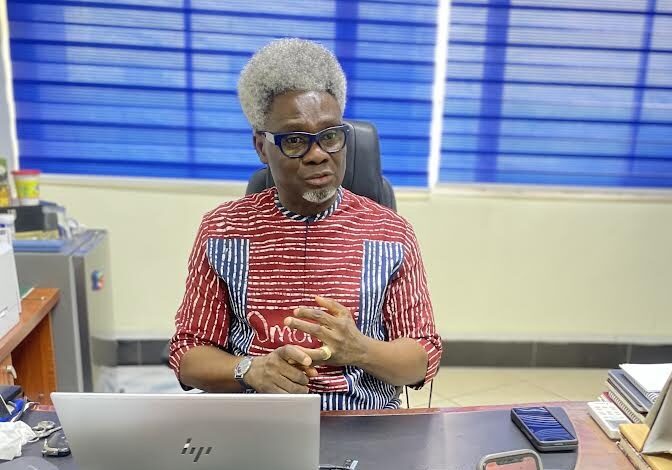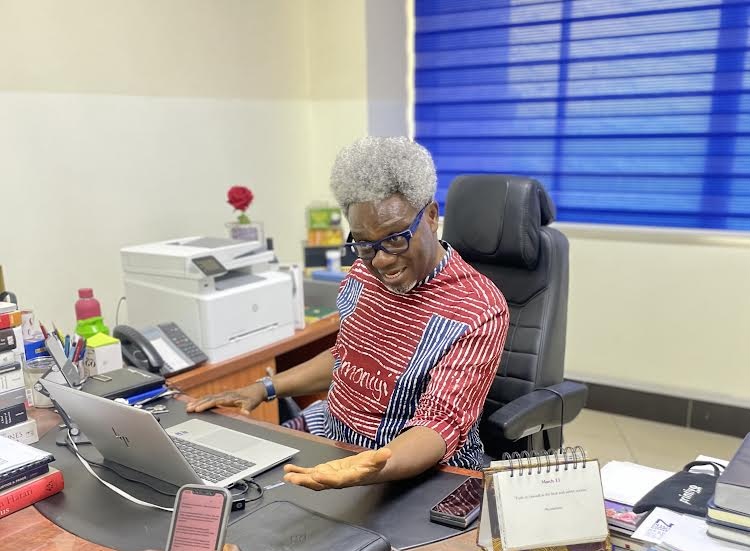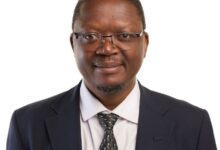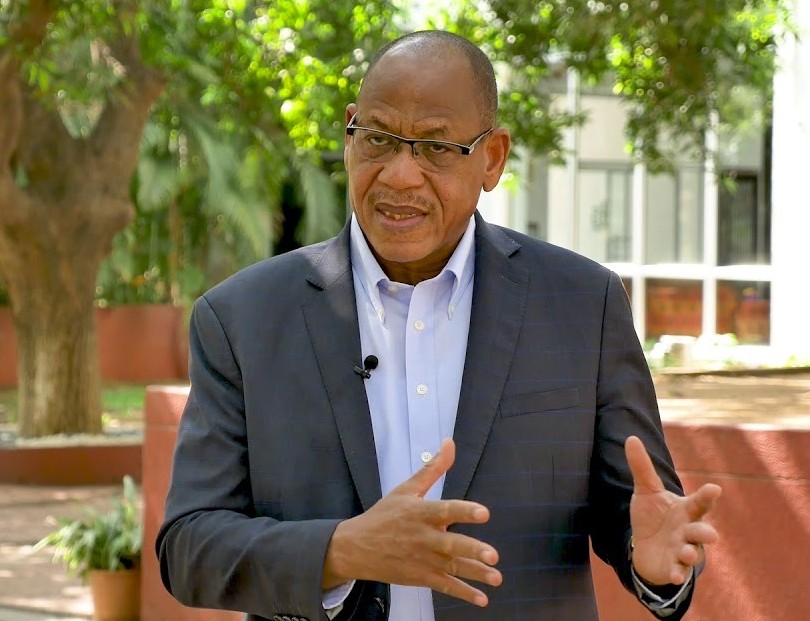INTERVIEW: Without Effective Communication Nation Building Is Impossible -Dr. Ibietan
By Sunday Etuka, Abuja

Dr. Omoniyi Ibietan is the Head of Media Relations at the Nigerian Communications Commission (NCC), and the Secretary-General of the African Public Relations Association (APRA). In this Exclusive Interview with TheFact Magazine, the Communications Czar speaks on effective communication as it relates to nations’ development, and the contribution of APRA to Africa’s growth. Excerpts:
As someone who has over 20 years of experience in media and communication practice, spanning journalism, academia, policy discourse, communication strategy, regulation, and stakeholder-relations, how important is effective communication to nation’s building?
Dr. Ibietan: Communications is life, therefore, the effectiveness of communication to nation building cannot be overemphasised. You could see the gap that has been created in our search for harmony in Nigeria arising essentially from the inability of our people and major actors and agencies, and key centres of nation’s governance to communicate. Their inability to engage in effective communication is part of the reasons why we are having some challenges in the polity. And so, to put it straight, without effective communication, nation building is impossible. Look at the most basic unit of social organisation, which is family. If the spouses are not communicating well, if they are not getting their children to be engaged in the place of communication, sharing values with them and telling them the appropriate way to behave, the society is going to be in a mess. Because if the basic unit is not properly organised around communication to build understanding, to build harmony and cohesion, that is what will happen in the larger society. And so, you will see that in a larger society, you will find a kind of disorganisation that has come on account of our inability to use communication effectively in solving our problems. Good, adequate and timely communications are empathetic, and are responsible communication. In this age of distortive technology, particularly, artificial intelligence, the possibility of falsehood and fake news being bandied as truth is there. So, when people communicate consciously knowing how damaging and bad communication can be to the society, it helps to build the society in a pattern that is harmonious and cohesive, to achieve government policies and programmes. On leadership, the best leaders are those who communicate effectively. In an organisation, leaders must be willing to build trust. Building trust means that you are able to communicate effectively. It is through communication that you build relationships and trust that any leader requires for organisational effectiveness. So, from good communication, to relationship building, from relationship building to effective communication.
What do you think are the strategic roles of the media in society, and how can these roles be played effectively to better the society?
Dr. Ibietan: You see, the Media from the normative point of view, is in the service of society. If we decide to be a bit academic about it, we can easily recall the social responsibility theory. Which of course, places the Media in a position of responsibility to the society. The Media, if you look at Nigeria’s Constitution, among most other social institutions, where you have the human agency intervening in a non-state faction, the Media is empowered under section 22 of the Constitution to hold the government accountable to the people. And you will find that particular section in all Constitutions of any democratic society. It may not be in section 22, it may be framed differently, but the idea of Media freedom or free speech of institutive processes that do not muffle the voice of the people, the Media or public opinion is constitutive of democracy. Media is important in setting the agenda for society. In other words, what the society and the people in government are thinking about is from the reportorial offerings of the Media, that both the citizens and representatives of the states are able to see which direction should be taken to advance the course of society. But you also know that the Media entertain, educate and inform. Fundamentally, the role of the Media is information. Information is so central because for the people to be able to participate in the governance process, to be able to have the data that they are required to make informed decisions, it will emanate from the agency that is constitutionally empowered to share information. To that extent, the Media is possibly the most central agency in society. If there is no Media in a democracy that democracy is dead and buried. Because it will be like walking blindfolded. The Media collectively illuminate the social fabrics, making the people see the realities.
As an image maker of your organisation, how important is media relations to crisis management in organisations?
Dr. Ibietan: Thank you very much. It is not something that we can overemphasise, the fact that the Media has become the carrier of social reality beyond reporting news. When the Radio and Television were the leading lights of communications systems, they were seen as mass communication channels. Today, the internet has become the carrier of all communications forms. Within the internet space, you will see mass communication: radio, television, newspapers, magazines, online and others. There has been so much transformation. A Media Relations Personnel must connect with these processes in both their elementary and advanced form, because things have gone so sophisticated. Everybody is connected to the Media in one way or the other. If it is not through traditional communication, it could be through radio and television, or newspaper and magazine like yours. Or it could be through the internet. But the point is that, irrespective of the format of how you are able to reach the Media, it is important that you take charge of that process because increasingly things have become so digitised and easier, even though the danger of fake news is there. Media relations which is the cultivation of goodwill between an organisation and the Media outlets is very important. A media relations specialist for instance, must have contact with the appropriate media institutions so that such organisation’s activities, programmes and the essence as a brand can be made known to the public and its stakeholders. So, the Media still remains an ally in the branding process, in building reputational assets for the entity concerned. Occupier of Media relations, therefore, has much to do beginning with the manner in which they communicate. Media relations remain so central in public affairs or corporate communications management and we cannot overemphasise it.
What are the identified challenges of effective media management in Nigeria, and how can these challenges be addressed?
Dr. Ibietan: One fundamental thing is education. You see, because of the distortion that has come to society on account of digital technologies, right from elementary school, consumers of news as a commodity must be taught how to make meaning out of what they see in the Media. In fact, Media literacy is referred to as information literacy. We should build this into the curriculum right from the elementary school, teaching them how to interpret news when they see it. How to identify even biases in news. It is fundamental. In other words, we speak to digital and Media literacy for all those who wish to be actors in the Media space. And all of us want to be, either as producers or as consumers of news items. What other challenges would we face? Global inflation. Increasing shrinkage of budget that is available for Media activities. Publicity is not cheap. But most organisations are increasingly challenged in funding, such that very meagre funds are made available for Media relations and publicity. So, what you find at the end of the day is that the work cannot be done effectively and efficiently on account of that because publicity does not come cheap. Poor funding is an issue. Again, in some societies, the Chief Communications officer, who is in charge of communications is often underrated in the scheme of things. Sometimes they see Media and communications officers as appendages of core management. But you see, public relations or communications management is not just a management function, it is also a leadership function. So, no organisation will succeed if it continues to relegate the Chief Communications Officer or the Director of Public Affairs or the Head of Corporate Communications to the background. If that happens, then the organisation should prepare for trouble. Every time you want to make key decisions, the people who lead the communications team must be there. Gone are the days when you finish a meeting of top management and then you say the PRO should be briefed on what to do. No! He or she as a professional must be at the meeting to guide you through your decisions. He or she is the person who is armed enough to advise you on the best decision to take if you are going to the public. Otherwise, if you are briefing him or her to go to the public it is going to be disastrous. So, the point is recognition. And that is why I am happy that in Nigeria, the public relations and communications function has been cadarised in the public service. In December 2023 Nigeria took a position. And not just in Federal, but all levels of government in Nigeria, that look, you can rise to become Director of Public Relations, you can rise to become Director of Public Affairs in the public service. It is now a cadre. So, if you join the public service as a public relations officer, it then means that you will be able to rise to the pinnacle of your own profession. That is already established in the Federal Civil service. And this is something we should also credit the government for. And you are aware Nigeria is leading when it comes to public relations and communications management. NIPR as we speak is the first national public relations institution to be chartered globally in 1990 even though it was established back in the 40s. Even the Chartered Institute of Public Relations in the United Kingdom which was established earlier, didn’t get the approval to become a Chartered Institute until 2005. That was 15 years after NIPR had been Chartered by the Decree promulgated in 1990 which is part of the laws of the Federal Republic of Nigeria. We have come a long way in public relations and communications management in Nigeria and we cannot afford to go back. We can only move forward. You may not be aware that Nigeria has just won the bid to host the World PR Forum in 2026. It didn’t come on a platter of gold, no, it was a conscious intentional effort of the NIPR to bid to do that.
In May last year, at the 35th Annual Conference and Annual General Meeting of APRA in Abidjan, Côte d’Ivoire, you were elected Secretary-General of the prestigious Association, how has your experience been?
Dr. Ibietan: it’s been very interesting and I will give the credit to my colleagues in APRA, beginning with the President of the NIPR, and other delegates from Nigeria who found me worthy of occupying that position, and who actually went out to convince delegates from other countries to vote for me. The rule also in APRA is that even if you are the only candidate running, you must still have to get the majority of the votes, and fortunately, I got all the votes at the Forum despite running unopposed. My emergence is also a recognition of sacrifices that Nigeria has made. APRA was established 50 years ago in Nairobi, Kenya after the International Public Relations Association had moved its Council meeting and General Assembly to Nairobi in June 1975. Then we have already had some professionals in Nigeria, people like Dr. Sam Epelle who of course became leader of the Public Relations Association in Nigeria and was of course the very First Director of Public Relations in the Federal Ministry of Information in Nigeria. People like him and others rally round, attending that Forum alongside people from nine other countries in Africa. It was Nigeria and those nine other countries including even Zimbabwe that was under colonial rule as at that time that met on the sideline of the International Public Relations Association (IPRA) Council and General Assembly meeting in Nairobi to form Federation of African Public Relations Association (FAPRA), that was on June 10, 1975. They couldn’t meet until a few years later in Lagos to begin to fine tune. A year after the meeting in Lagos, Chief Bob Ogbuagu who was also a leading light of public relations management in Nigeria, was elected as Chairman. After him, we also had people like Mike Okereke who also was elected in 1990. As a matter of fact, Nigeria, Ghana, Kenya, Egypt, Cameroon and others have been the real string that are holding APRA together. Expanding the reach to other countries. We had people like Kabir Dangogo, who recently passed, may his soul rest in peace, who was the first Nigerian to be elected Secretary-General of APRA, that was in 2002/2003. After him, we had other people who had led APRA. We had Chief Yomi Badejo-Okusanya who of course had the privilege to be Secretary-General of APRA, and also, the President of APRA. He was elected in 2011, in Mombasa at the annual conference, which was my own first conference as Secretary-General to Mr. Peter Mutie of the Republic of Kenya. He remains one of our leading lights. So, we had very fantastic people from Nigeria in APRA, leaving very big shoes for me. I am not even sure whether I will fit into the big shoes they left behind. They have represented Nigeria very well in APRA, showing examples of what Nigeria needs to showcase to the world in terms of public relations and communications management. The fact is that I have been offered a big cap to wear, despite the fact that my head is small. The point is that we can only do better than what our predecessors had done. And that is the only way we can make them proud.

As a professional body in Africa, how has APRA shaped the Public Relations practice in Africa, and continent’s development in general?
Dr. Ibietan: At Abidjan when I was elected. Mr. Arik Karani of Kenya was also elected President. So, he now serves concurrently, as President of public relations in Kenya, as well as APRA. While Mitchell Mekeme from Cameroon was elected as Vice President. We are thankful for this election, and what we are trying to do is to see how we can expand the democratic space to ensure that APRA is present in all the countries in Africa. The second reason for our coming is to see how we can improve on the financial status of APRA, to ensure that we diversify the source of revenue because there is so much to do, and except you have robust financial standing you may not be able to achieve much as you have loved to. Thirdly, we want to ensure that APRA’s presence is felt in every point at which public relations and communications management is required to make things better. So, we plan to leverage our observer status in the African Union because APRA has an observer status with the African Union. Through that point we will now leverage that Status to begin to engage with African Union and Multinational Agencies that are focused on Africa. To begin to engage with governments in Africa to see how we can offer advice. So, APRA exists not just to advise to ensure that the appropriate communication and professional public relations input of every project of every government and institutions is available, but APRA is also shaping knowledge production in public relations and communications management, and shaping knowledge sharing. APRA is fundamentally a training centre.
Bad leadership is impeding good governance in Africa, how can APRA help promote good governance in Africa?
Dr. Ibietan: APRA is not available to whitewash bad leadership. APRA is available to be a partner to any institutions or governments that may have the challenge of leadership. We are ready to offer our expertise not just to institutions in Africa to make life better, to prepare for growth on development in Africa, but even governments. We have the challenge of leadership in Africa, but this challenge is all over the world. But what we are trying to do is to reshape the narrative that sees Africa as the centre of squalor, disease and poor leadership. This is what we are trying to do. To offer counsel on how to do things better. So, that Africa does not carry the stigma of being the worst continent in the world. Because a lot of great things are happening in Africa. And we want to see that the communications component of those development programmes is not compromised. If the communication component is compromised, development programmes will suffer. So, APRA is here calling on governments and agencies in Africa to take communications seriously. Ensure that stakeholders of their projects are carried along. Engage professionals and give them the freedom to be able to guide the processes of directing the communication component of what they do. APRA is saying that governments, people and agencies in Africa must continually improve on their conversational capacities to ensure that things are discussed before they become crises and wars. Because once you have destruction like wars, they constitute a major set back on development programmes. So, this is our take. And we will be gathering in June in Mombasa, where APRA was born. We usually hold our conferences in May but we chose June this year to coincide with the formation of APRA, and interestingly, Kenya is hosting which is where APRA was established. We are focusing on responsible digital communication. How do we explore this in Africa in a responsible manner to enhance our development efforts? So, this is going to be the focus. We will be looking at cybercrimes and Artificial Intelligence within the ambit of digital communication. To see how they can be deployed to serve public good rather than to yield to destruction that will drag Africa backward.
What benefits do you think Nigeria has derived from being a member of APRA since its inauguration in 1975 in Nairobi, Kenya?
Dr. Ibietan: It is not just about the benefits that Nigeria has derived. We should start with what Nigeria has offered. Nigeria was one of the 10th countries that established APRA in Nairobi on June 10, 1975. And Nigeria has never wavered its commitment. As a matter of fact, APRA for a few years became moribund until it was revived by concerned people, including Mallam Dangogo who just passed. Between 1997 and 2002 there was dormancy in APRA. And by the time concerned people met, a Nigerian was still one of the people that were asked to reawaken APRA. And mention Mallam Dangogo who just passed. They met in 2002, and by 2003, a normal conference they have been having before, in Accra, where he was elected secretary general, and he was there till 2006, where at the conference in johannesburg, Dr. Wole Adamalekun took over from Mallam Dangogo and under the mentorship of Dangogo, he became the secretary general of APRA, and when he left, another Nigerian, Chief Badejo was elected Secretary General In 2011 at Mombasa Conference, that was my own very first conference, and Badejo later became the President of APRA after being Secretary General because he has the honour of being the first Nigerian who would be Secretary General and President of APRA. His tenure ended in Abidjan and I was elected as Secretary General. I would like to point this out to you, when Dr. Adamalekun was elected the Secretary General at the Accra conference in 2003, the following year, when Uganda hosted APRA, at that point, a decision was taken that to prevent the dormancy that had happened before, unanimously, everybody asked Nigeria to please take up the Secretariat of APRA. Nigeria now became the Headquarters so to say of APRA. And you know that the Secretariat is the PowerHouse of any Organisation. and then something happened. It turned out that APRA needed to undergo a proper registration as a corporate entity, it was at that point that Dr. Adamalekun was now given the mandate to register APRA in Nigeria, so as we speak, APRA is not anywhere in the world, but in Nigeria. It is under companies and allied matters Act that APRA was registered. So, that is how much Nigeria has given. Nigeria contributed in preventing APRA from dying. APRA can trade anywhere in the world with that name because it is registered and aside that the Secretariat is in Nigeria, although you don’t have to be a Nigerian to be Secretary General. The gains are unquantifiable. One of the things we are trying to do is get our colleagues in APRA to agree for Nigeria to host the APRA Conference in 2026. So, we plan it in such a way that we get people to the Conference in Nigeria about the same time that we are hosting the World PR Forum. So, you can imagine what is going to happen in Nigeria in 2026. We will mobilise our colleagues from across Africa and globally to this country.
How are you balancing your role as the Secretary of APRA, with that of your family as a husband and father?
Dr. Ibietan: Thank you very much. I am a dad to many, my biological children as well as my niblings, and friend to many. And that comes with a lot of responsibility. So, what I try to do first and foremost is to be in good health. Essentially I eat healthy and I play tennis just to keep fit, and also play scrabble. I love meeting people, especially people from other cultures. You know Nigeria is a very heterogeneous society. And I am particularly happy that we are a good example of such society and despite the challenges we are together. So, it is always a pleasure to meet people from other cultures. I read a lot and I also write. And with the approval of the management of NCC, I also teach in Business School, so I am so busy that sometimes 24hours is inadequate for me. But I have been able to balance this. By the decision of the Executive Council of APRA, we want to be seen at every centre that matters in Africa for good or challenges. There are places in Africa where there are challenges, we want to be there to solidarise and also offer suggestions on how things can be made better. So, I am trying to do and to also be a good husband and father. Hope they will continue to tolerate me. Because all of my achievements were due to their support and patience.






